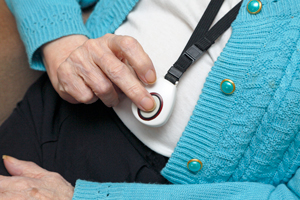Remote monitoring can reduce costs, readmissions
 Health technology firm Royal Philips and insurer Humana Inc. announced a collaboration in patient monitoring, which they believe will improve care and health outcomes for select high-risk Medicare Advantage members.
Health technology firm Royal Philips and insurer Humana Inc. announced a collaboration in patient monitoring, which they believe will improve care and health outcomes for select high-risk Medicare Advantage members.
Medicare Advantage Plans — sometimes called “Part C” or “MA Plans” — are an “all in one” alternative to Original Medicare. Offered by private companies approved by Medicare, these “bundled” plans include Medicare Part A (Hospital Insurance)andMedicare Part B (Medical Insurance), and usually, Medicare prescription drug (Part D).
Humana is identifying at-risk members and offering them the Philips Lifeline medical alert service, including Auto Alert, a fall-detection technology supported by Philips CareSage predictive analytics. Early referrals of patients with chronic conditions, and those at risk of falls, can help enable timely care and interventions, according to Humana. It can also help reduce unnecessary and costly hospital readmissions.
In addition, Philips CareSage predictive analytics, which collects and analyzes data from multiple sources including Philips Lifeline, will give care teams a line-of-sight into seniors’ wellbeing upon discharge, when the risk of readmission is high. By identifying patients who are at risk for emergency transport in an upcoming 30-day period, predictive analytics can help identify early intervention opportunities and thereby enable the delivery of proactive care to help reduce avoidable emergency admissions.
Research shows 57% of Medicare patients are released from the hospital without any direct monitoring by a healthcare professional, contributing to an annual cost of unnecessary readmissions of $17 billion for Medicare patients alone.
Through the collaboration, Humana has deployed Philips’ remote member monitoring solution and connected measurement devices to select members with congestive heart failure (CHF), allowing care managers to monitor and understand meaningful changes in a member’s condition.
Humana is identifying a pilot group of members with severe CHF. Philips will provide them with kits that include an interactive tablet that syncs data from connected measurement devices via wireless technology. These devices, including a weight scale, blood pressure monitor and pulse oximeter, allow members to self-manage their condition, and share health information with their care manager daily. This data will be used to support Humana care teams in making informed and proactive care decisions with the pilot group in an effort to help reduce unnecessary readmissions.